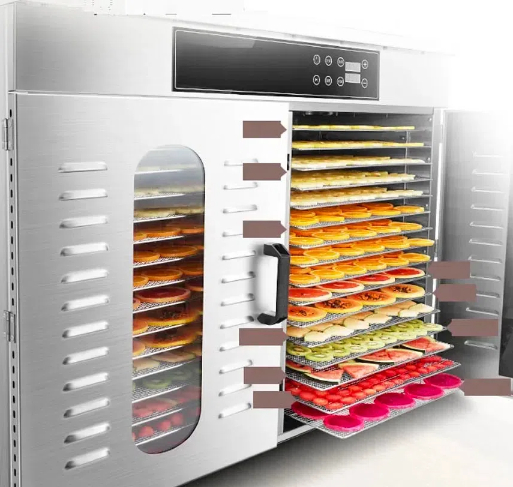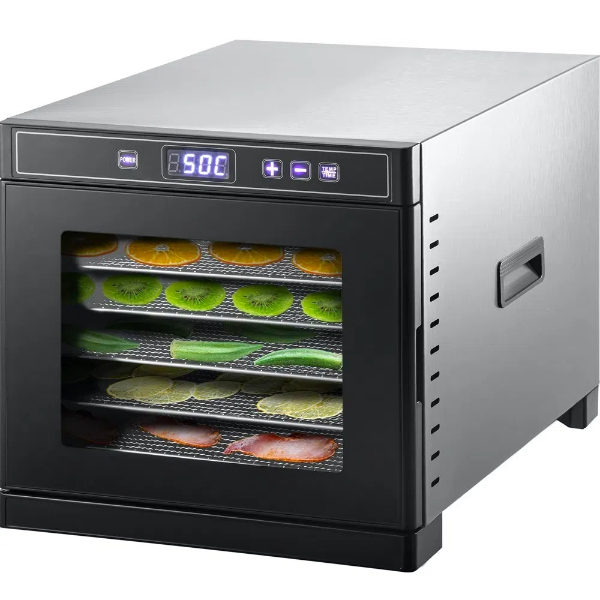
Content Menu
● Introduction to Food Drying Technology
● The Rise of Food Dehydrators in Malaysia
>> Benefits of Using a Food Drying Machine
● Types of Food Drying Machines Available in Malaysia
>> Home Food Dehydrators
>> Commercial Food Drying Equipment
>> Specialized Drying Machines
● Features to Consider When Choosing a Food Drying Machine
● Popular Brands and Models in Malaysia
● Applications of Food Drying Machines in Malaysia
>> Home Use
>> Commercial and Industrial Use
● The Science Behind Food Drying
>> Key Factors in the Drying Process
● Maintenance and Care of Food Drying Machines
● Innovations in Food Drying Technology
● Conclusion
● Frequently Asked Questions
>> 1. What types of food can I dry using a food dehydrator?
>> 2. How long does it take to dry food in a dehydrator?
>> 3. Are food drying machines energy-efficient?
>> 4. How do I clean my food dehydrator?
>> 5. Can I use a food drying machine for commercial purposes in Malaysia?
Introduction to Food Drying Technology
In recent years, the popularity of food drying machines in Malaysia has skyrocketed, with both home cooks and commercial food producers recognizing the benefits of this preservation method. Food dehydrators, also known as fruit dryer machines or vegetable drying machines, have become essential tools in Malaysian kitchens and food processing facilities. These versatile appliances offer a way to extend the shelf life of various foods while retaining their nutritional value and intensifying their flavors.
The Rise of Food Dehydrators in Malaysia
Malaysia's tropical climate, with its high humidity and temperatures, presents unique challenges for food preservation. This environment has led to an increased demand for efficient and reliable food drying equipment. From small home food dehydrators to large-scale industrial dehydrators, Malaysians are embracing this technology to combat food waste and create delicious, long-lasting snacks and ingredients.

Benefits of Using a Food Drying Machine
1. Extended shelf life of foods
2. Preservation of nutritional content
3. Space-saving food storage
4. Creation of healthy snacks
5. Cost-effective food preservation
6. Reduction of food waste
Types of Food Drying Machines Available in Malaysia
Home Food Dehydrators
For individuals and families looking to preserve small batches of food, home food dehydrators are an excellent choice. These compact machines typically feature multiple trays and adjustable temperature controls, allowing users to dry a variety of fruits, vegetables, and herbs. Many models available in Malaysia come with 5 to 10 trays, providing ample space for drying different foods simultaneously.
Commercial Food Drying Equipment
Businesses in the food industry often require larger, more powerful drying solutions. Commercial food drying equipment in Malaysia ranges from medium-sized dehydrators with 10-20 trays to industrial-scale machines capable of processing large volumes of food. These units are designed for continuous operation and often feature advanced controls for precise temperature and humidity management.
Specialized Drying Machines
Some food producers in Malaysia require specialized drying equipment for specific products. For example:
- Meat drying machines for producing jerky and dried meat products
- Herb and spice dehydrators for preserving aromatic plants
- Fruit dryer machines optimized for tropical fruits
Features to Consider When Choosing a Food Drying Machine
When selecting a food dehydrator in Malaysia, consider the following features:
1. Capacity: Determine how much food you need to dry at once.
2. Temperature Control: Look for machines with adjustable temperature settings for different types of food.
3. Air Flow: Ensure even drying with proper air circulation.
4. Material: Stainless steel is durable and easy to clean.
5. Energy Efficiency: Look for models with low power consumption.
6. Noise Level: Consider quieter options for home use.
7. Additional Features: Some models offer timers, automatic shut-off, and digital displays.

Popular Brands and Models in Malaysia
Several brands offer high-quality food drying machines in Malaysia:
1. BioloMix: Known for their BPA-free vegetable and fruit food dryers with digital timers and temperature controls.
2. Excalibur: A trusted name in food dehydrators, offering both home and commercial models.
3. Kawan Engineering: Provides industrial-scale dryers for high-volume production.
4. AEC Machinery: Offers a range of food processing machines, including dehydrators.
Applications of Food Drying Machines in Malaysia
Home Use
Malaysian households use food dehydrators to create healthy snacks, preserve seasonal fruits and vegetables, and prepare ingredients for cooking. Popular applications include:
- Drying tropical fruits like mangoes, pineapples, and jackfruit
- Creating vegetable chips and fruit leathers
- Preserving herbs and spices
- Making homemade pet treats
Commercial and Industrial Use
In the commercial sector, food drying machines play a crucial role in various industries:
1. Snack Food Production: Creating dried fruit snacks, vegetable chips, and meat jerky.
2. Ingredient Preparation: Drying herbs, spices, and vegetables for use in soups, sauces, and ready-to-eat meals.
3. Agricultural Processing: Preserving excess produce during harvest seasons.
4. Pharmaceutical and Herbal Medicine: Drying medicinal plants and herbs.
The Science Behind Food Drying
Food drying machines work by removing moisture from foods through a combination of heat and air circulation. This process inhibits the growth of bacteria, yeasts, and molds, effectively preserving the food. In Malaysia's humid climate, efficient moisture removal is crucial for successful food preservation.
Key Factors in the Drying Process
1. Temperature: Different foods require specific drying temperatures to maintain quality and safety.
2. Humidity: Controlling ambient humidity is essential for efficient drying.
3. Air Circulation: Proper airflow ensures even drying and prevents hot spots.
4. Food Preparation: Proper slicing and arrangement of food items affect drying efficiency.
Maintenance and Care of Food Drying Machines
To ensure the longevity and efficiency of your food drying machine in Malaysia, follow these maintenance tips:
1. Clean trays and interior after each use
2. Check and clean air filters regularly
3. Inspect heating elements and fans for proper function
4. Store the machine in a dry place when not in use
5. Follow manufacturer's guidelines for deep cleaning and maintenance
Innovations in Food Drying Technology
The food drying industry in Malaysia continues to evolve, with new technologies emerging to improve efficiency and product quality:
1. Smart Dehydrators: Wi-Fi-enabled machines that can be controlled via smartphone apps.
2. Energy-Efficient Models: New designs that reduce power consumption without sacrificing performance.
3. Hybrid Drying Systems: Combining different drying methods for optimal results.
4. Compact, Multi-Function Units: Space-saving designs that offer multiple food preservation functions.
Conclusion
Food drying machines have become an integral part of Malaysia's culinary landscape, offering both home cooks and commercial food producers an efficient way to preserve a wide variety of foods. From compact home food dehydrators to large-scale industrial equipment, these machines help reduce food waste, create healthy snacks, and preserve the flavors of Malaysia's bountiful produce. As technology continues to advance, we can expect even more innovative and efficient food drying solutions to emerge in the Malaysian market.

Frequently Asked Questions
1. What types of food can I dry using a food dehydrator?
Answer: Food dehydrators can be used to dry a wide variety of foods, including fruits, vegetables, herbs, meats, fish, and even flowers. In Malaysia, popular choices include tropical fruits like mangoes and pineapples, local herbs and spices, and various vegetables for making healthy chips.
2. How long does it take to dry food in a dehydrator?
Answer: The drying time varies depending on the type of food, its moisture content, and the dehydrator's settings. Generally, fruits can take 6-16 hours, vegetables 4-10 hours, and meats 4-12 hours. It's important to follow specific recipes or guidelines for best results.
3. Are food drying machines energy-efficient?
Answer: Many modern food drying machines are designed to be energy-efficient. While they do consume electricity during operation, they typically use less energy than ovens and can process large quantities of food at once, making them relatively efficient for food preservation.
4. How do I clean my food dehydrator?
Answer: Clean your food dehydrator after each use by washing the trays with warm, soapy water. Wipe down the interior with a damp cloth. For tougher residues, use a mild detergent. Always ensure the machine is unplugged before cleaning and thoroughly dry all components before reassembling.
5. Can I use a food drying machine for commercial purposes in Malaysia?
Answer: Yes, there are food drying machines specifically designed for commercial and industrial use in Malaysia. These range from medium-sized units suitable for small businesses to large-scale industrial dehydrators for high-volume production. Ensure you choose a model that meets local food safety regulations and has the capacity to meet your production needs.












